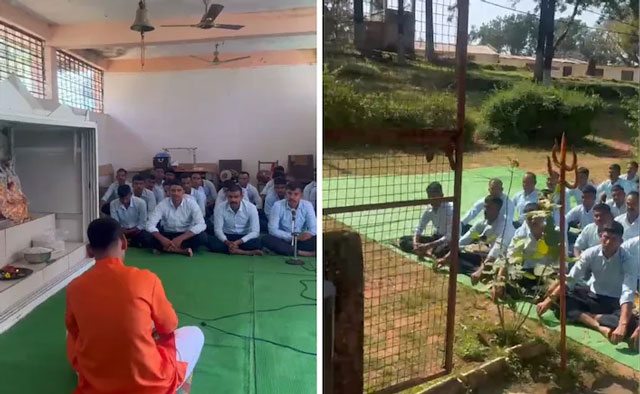Daijiworld Media Network - Bhopal
Bhopal, Nov 7: A recent order from the Madhya Pradesh Police Training Wing directing recruits to read chapters from the Bhagavad Gita during training has triggered a sharp political storm, with the opposition Congress alleging attempts to “saffronise” the police force and the ruling Bharatiya Janata Party (BJP) defending it as a step toward “moral grounding and character building.”
The directive, issued by Additional Director General of Police (ADGP–Training) Raja Babu Singh, instructs all eight police training schools in the state to have recruits read one chapter from the Shrimad Bhagavad Gita before their nightly meditation sessions during the holy month of Margashirsha.

Speaking to the media, Singh said the initiative aims to help trainees lead “a righteous and disciplined life.” “The month of Margashirsha is considered sacred to Lord Krishna. Reading one chapter from the Gita before meditation will inspire moral strength and self-control,” he stated.
The ADGP, known for promoting spiritual discipline within the police force, had earlier introduced recitations from Tulsidas’ Ramcharitmanas at the same institutions, citing their value in instilling ethics among the 4,000 recruits across Madhya Pradesh.
Singh said he had implemented similar programmes during his tenure in Gwalior, even distributing Bhagavad Gita copies among jail inmates to encourage reform and reflection.
However, the directive has drawn strong criticism from the Congress, which called it an “unconstitutional attempt to saffronise the police.” Party spokesperson Bhupendra Gupta said, “Every citizen has the right to follow their own faith. This is a clear attempt to radicalise the force under the guise of spirituality. Action should be taken against those responsible.”
Countering the allegations, BJP spokesperson Pankaj Chaturvedi accused the Congress of politicising a cultural exercise. “If someone in India considers the Bhagavad Gita communal, it raises questions about their Indianness,” he said. “The Gita is a book of philosophy, not religion. No one is being forced. If its teachings can improve policing, it will strengthen society.”
Meanwhile, police recruits continue to spend evenings alternating between Chaupais from the Ramcharitmanas, chapters from the Bhagavad Gita, and silent meditation sessions — a combination that the department says blends “faith, focus, and fitness.”
Building on the initiative, the police department has announced three days of Heartfulness Meditation sessions from December 19 to 21, coinciding with World Meditation Day. The sessions will be held at historic sites including Upper Lake (Bhopal), Rajwada (Indore), Dhuandhar Falls (Jabalpur), Mahakaleshwar Temple (Ujjain), and Khajuraho Temples (Chhatarpur).
Special DG Raja Babu Singh said the goal was to “connect meditation with the state’s cultural and historical identity.” The programme, open to all citizens, will be conducted by 76 trained Heartfulness instructors from within the police force across 55 districts — at no cost to the department.
As the political debate continues, the initiative stands at the intersection of spirituality, discipline, and state policy — raising questions about the line between cultural heritage and secular governance in India’s police training system.